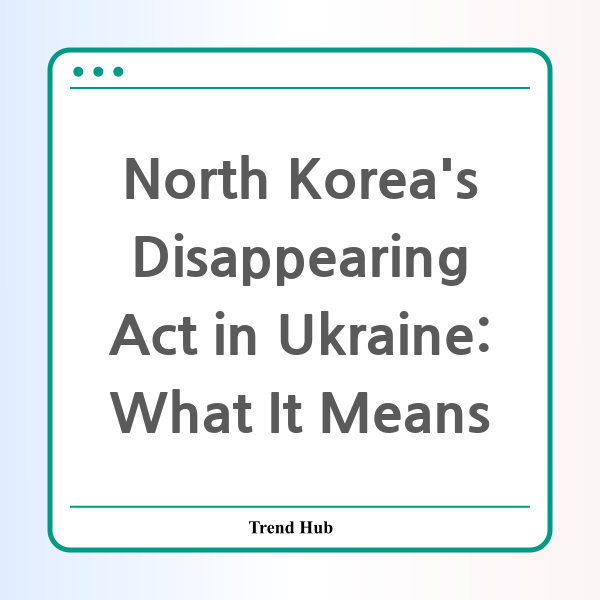* This website participates in the Amazon Affiliate Program and earns from qualifying purchases.

Is North Korea’s involvement in Ukraine fading or just re-strategizing? Recent reports suggest a significant reduction in the presence of North Korean troops on the front lines in Ukraine, particularly in the Kursk region. This shift has sparked a wave of speculation regarding Pyongyang's long-term military strategy and its implications for both the Ukrainian conflict and international relations.
Ukrainian forces have observed that North Korean contingents, previously a notable presence in the region, have largely ceased their activities. A senior communications officer from Ukraine's 80th Air Assault Brigade noted that while reports of North Korean troops remain from other parts of the battlefield, they have 'disappeared' from the brigade's area. This observation raises questions about the stability of North Korea’s military commitment in Ukraine.
Historically, North Korea has aligned itself with Russia, especially following the geopolitical shifts after the invasion of Ukraine. However, the abrupt reduction of its military engagement raises several key points worth discussing:
- Reasons for Withdrawal: Initial theories suggest that heavy casualties may have prompted North Korea to pull back its forces temporarily. Reports indicated that up to 4,000 North Koreans could have been wounded or killed since their deployment, leading to speculation that they are regrouping and strategizing before any potential redeployment.
- Strategic Reassessment: Experts are divided on whether this signals a permanent withdrawal or a mere tactical retreat. Some officials argue that the North Korean troops might simply be resting and will return with a new approach to combat. This unpredictability complicates the landscape of warfare in the region.
- Political Implications: Ukraine's President has noted that while some North Korean forces are currently off the front lines, their potential resurgence in the future cannot be disregarded. The partnership between North Korea and Russia is becoming increasingly fortified, leading analysts to believe that the geopolitical dynamics may shift once more.
- The Role of Intelligence: Both Ukrainian and Western intelligence have been monitoring the situation closely. Although there are discrepancies in reported troop movements, the intelligence suggests that North Korea's military capabilities remain intact. They could re-engage at any moment, especially if the war in Ukraine escalates.
Furthermore, as North Korea strengthens its ties with Russia, the ramifications extend beyond the battlefield. As both nations cope with international sanctions, their collaboration could lead to advanced military strategies and enhanced capabilities. President Zelenskyy's comments at the Munich Security Conference highlighted the importance of vigilance against any potential resurgence of North Korean forces, emphasizing their resilience and adaptability in modern warfare.
Looking Forward
The future of North Korean involvement in Ukraine remains uncertain. As the conflict evolves, so too will the roles of various international players. The importance of understanding North Korea's strategy is crucial not only for Ukraine but also for global security. The implications of a shifting frontline are significant, and it is vital for countries worldwide to remain alert to the potential for new alliances and military strategies that could emerge from the shadows of this conflict.
In conclusion, whether North Korea’s diminished presence is a temporary lull or a strategic withdrawal, the ramifications of its actions will reverberate throughout the geopolitical landscape. Increasing ties with Russia and the ongoing conflict necessitate continuous monitoring and analysis of North Korea’s military intentions.
* This website participates in the Amazon Affiliate Program and earns from qualifying purchases.